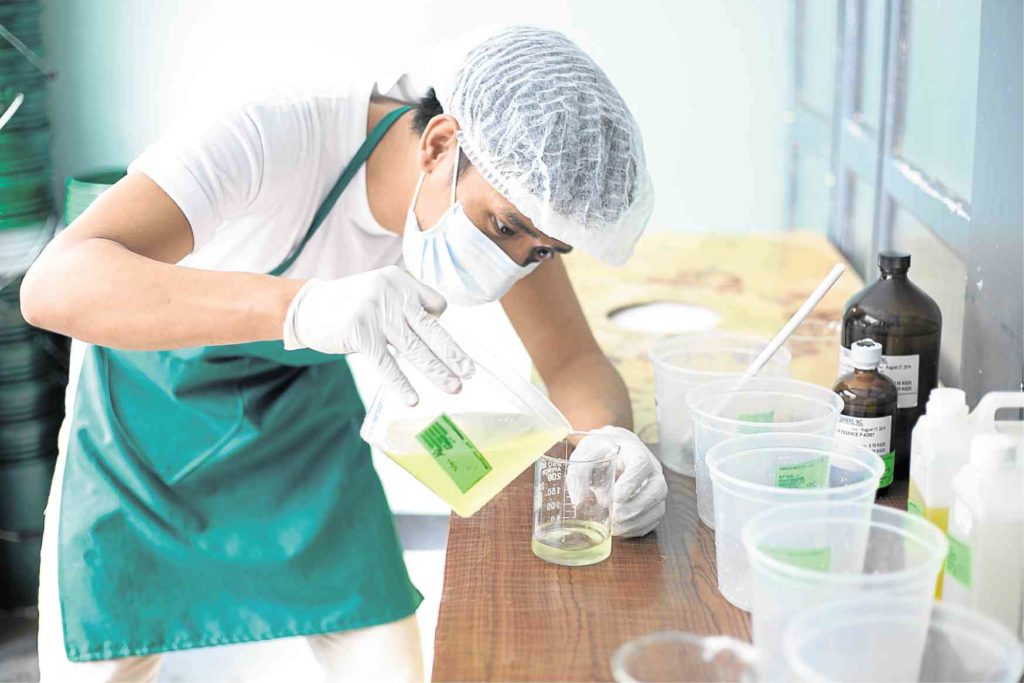
Messy Bessy’s line of products use natural, biodegradable and nontoxic products that kill bacteria but do not cause side effects linked to harmful chemicals.
In the Philippines, more than 3.3 million out of 3.8 million out-of-school children and youth are aged 15 to 24, data from the Philippine Statistics Authority’s 2016 Annual Poverty Indicators Survey show. The lack of formal schooling makes it almost impossible for the affected youth to earn college degrees which lead to better paying jobs. Some of them become exposed to conflicts with the law to make ends meet. Between 2012 and 2015, the Philippine National Police recorded nearly 40,000 cases of juvenile delinquency.
To provide opportunities for these disadvantaged and vulnerable youth—including those who went through harsh experiences like abuse, incarceration, human trafficking and extreme poverty—Krie Lopez, the entrepreneur behind Messy Bessy’s eco-friendly personal and home care products, created an inclusive business model that provided disadvantaged youth with the opportunities to pursue education while working part time.
At the core of Messy Bessy’s inclusive business model is an initiative called the “Helping Ourselves Program” (HOP) that supports at-risk youth in completing their education, enhancing their work ethics and sharpening their other skills. The participants of HOP learn and achieve all these while doing part-time work for Messy Bessy, where they get exposed to different aspects of the company’s operations.
For Lopez and her team, giving work opportunities to vulnerable youth is only the first step to get them out of poverty and rebuild their lives. An equally important step is to develop the beneficiaries’ work ethic and self-esteem so they can be empowered to lift themselves out of poverty.
Values formation
Lopez built Messy Bessy after her stint heading a company’s corporate social responsibility (CSR) arm. She wanted to develop a more sustainable way of making more impact so she built an enterprise that initially provided work opportunities for abused girls. This helped her break away from the restrictions accompanying money donations.
In creating Messy Bessy’s inclusive business model, Lopez found an opportunity to contribute to environmental preservation while providing opportunities for abused girls. Messy Bessy’s line of products use natural, biodegradable and nontoxic products that kill bacteria but do not cause side effects linked to harmful chemicals. When Messy Bessy started making profits, Lopez and her team found flexible sources of funding to spur the company’s growth and ensure the sustainability of running HOP.
“If the business fails profit-wise, it will be difficult to fund the programs for beneficiaries. Aside from sustaining the company itself, it is necessary to make sure that it earns enough to be able to help those in need,” Lopez said.
As chief of Messy Bessy, Lopez oversees all the aspects of business growth. At the same time, she remains deeply involved in providing intervention for the company’s beneficiaries. For 15 minutes every day, Lopez would engage her team through discussions. They’d tackle definitions, tips and team building activities that help the company’s beneficiaries understand values they may have not learned yet including that of open mindedness, constructive criticism, leadership and tactfulness.
Aside from performing official duties such as managers and supervisors, the members of Lopez’s team act as mentors and tutors. An accounting manager, for example, will teach students who have a hard time with their accounting subjects. Before each day ends, Lopez leads a conference to discuss challenges that beneficiaries face such as issues on work performance, motivation and family support.
Intervention and impact
Messy Bessy registers more than 50-percent growth yearly, a development that helped diversify and increase the company’s beneficiaries. To date, Messy Bessy has assisted almost 300 young adults and produced 20 high school graduates, 21 college graduates and 61 college enrollees. HOP learners also make up 75 percent of the company’s workforce.
One of them is Angiela Deligero who graduated at the top of her class but decided to work and provide for her family. She worked as a sales lady and factory worker until she found an opportunity in Messy Bessy. Deligero balanced her responsibilities at work, home and school until she earned her Bachelor of Science in Accounting Technology. She graduated cum laude despite the challenges of juggling responsibilities.
When Deligero graduated in 2015, Lopez’s team realized the potential of replicating HOP in other businesses. That same year, Messy Bessy established its social impact arm, the Helping Ourselves through Sustainable Enterprises (HOUSE) Foundation, where Deligero now works as a program officer.
Through the HOUSE Foundation, Messy Bessy was able to make its partner enterprises replicate HOP, a step that Messy Bessy took to meet the growing manpower needs of its increasing beneficiaries. The HOUSE Foundation expanded its network of partner schools and businesses where disadvantaged youth can receive work and training opportunities. The companies who now work with the HOUSE Foundation include Bauhaus Fabrics, Happy Skin Cosmetics, Starbucks Philippines, and Straightforward Clothing.
Touching more lives
Messy Bessy and the HOUSE Foundation now look forward to hitting its 2020 targets of having 500 youth assisted, 50 engaged partner communities, and 45 beneficiaries earning their college degrees. To realize this goal, Messy Bessy looks at adding new stores and sustaining its growth level every year.
Lopez believes that increased interest in eco-friendly products gives them an advantage in realizing Messy Bessy’s goals.
“More establishments are moving towards greener cleaning products so the company intends to capitalize on this and offer our industrial-sized cleaners,” Lopez said. “Messy Bessy is adamant in its endeavor to push for a greener and more socially aware future when people choose products that are not only environment-friendly but also effective, safe and socially responsible.”
Messy Bessy was a nominee in the first Asean Inclusive Awards 2017, an integral part of the Asean Business Awards initiated by the Department of Trade and Industry-Board of Investments (DTI-BOI) in partnership with the Asian Development Bank, Asian Business Advisory Council, Credit Suisse, and the International Finance Corp.